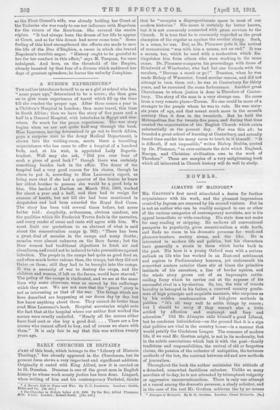A NURSE'S EXPERIENCES.* THE author introduces herself to us as
a girl at school who has, "some years ago," determined to be a nurse ; she then goes on to give some experiences of travel which fill up the time till site reaches the proper age. After these comes a year in a Children's Hospital in London ; then more travel, this time in South Africa ; then we have the story of five years and a half in a General Hospital, with interludes in Egypt and else- where. So much for the peace experiences. The war story begins when we are not quite half-way through the book. Miss Laurence, having determined to go out to South Africa, pays a surprise visit to the Army Medical Department, is shown into the waiting-room, meets there a travelling acquaintance who has come to offer a hospital of a hundred beds, and, at his wish, is appointed Lady Superin- tendent. Well may she ask, " Did you over hear of such a piece of good luck ? " though there was certainly something besides luck in the affair. The donor of the hospital had a very good reason for his choice, though he chose to put it, according to Miss Laurence's report, as being sure that if she had a quarter of the brains he know her eldest brother to possess she would be a good help to him. She landed at Durban on March 31st, 1900, worked for about a year and a half, and then had to resign for reasons of health, but not till she had been mentioned in despatubea and had been awarded the Royal Red Cross. The story has been told several times before, but never better told : simplicity, artlessness, obvious candour, are the qualities which Sir Frederick Treves finds in the narrative, and every reader of sense and taste will agree with him. We must limit our quotations to an abstract of what is said about the concentration camps (p. 302) : " There has been a great deal of measles in the oamps and many deaths ; measles were almost unknown on the Boer farms ; but the Boer women had traditional objections to fresh air and cleanliness, and could not be induced to take precautions against infection. The people in the camps had quite as good food as, and often much better rations than, the troops, but they did not thrive on thorn ; still they had to be brought into the camps. It was a necessity of war to destroy the crops, and the children and women, if left on the farms, would have starved." The policy of the camps is vindicated, and we see at the same time why some observers were so moved by the sufferings which they saw. Wo are not sure that the " peace " story is not as interesting as that of the war. The things which are here described are happening at our doors day by day, but few know anything about them. They cannot do better than read Miss Laurence's book, Hospital secretaries might note the fact that at the hospital where our author first worked the nurses were cruelly underfed. "Nearly all the nurses either have food sent or else buy a good deal. . . . There are a few nurses who cannot afford to buy, and of course we share with them." It is only fair to say that this was written twenty years ago.






































 Previous page
Previous page